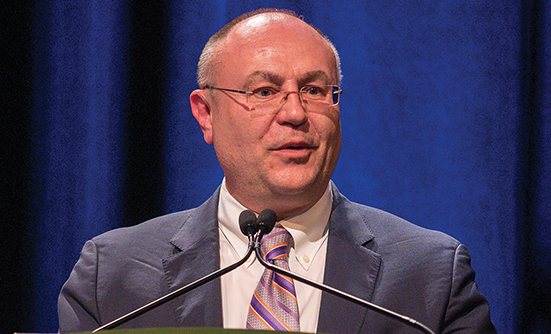Colorectal Cancer
With the availability of stool-based and at-home tests, is traditional colonoscopy still
necessary? Read More ›
Find financial assistance programs available for colorectal cancer drugs. Read More ›
By Joe Bullock
Joe Bullock finally heard the 3 little letters he’d been waiting to hear since his colorectal cancer diagnosis: NED. But he wasn’t expecting the uncertainty that shortly followed, feeling stuck in the in-between phase “after cancer.” Read More ›
By Joe Bullock
After ignoring his abdominal pain and blood in his stool because of family stresses, Joe Bullock finally had a colonoscopy done at the urging of his wife. A stage III colon cancer diagnosis and the support he received from other patients provided new insights. Read More ›
By Lydia Virgo
Losing weight and her appetite made Lydia Virgo go to the doctor to get a blood test, which showed a low iron count. Although exhibiting no pain, Lydia’s CT scan and colonoscopy revealed a tumor in her colon. Read More ›
By Joe Bullock
Six months before he was diagnosed with stage IIIB colorectal cancer, both of Joe Bullock’s parents passed away. Chemotherapy hit him hard and stirred a mixture of depression and feelings of inadequacy as a husband and father. Then he discovered the power of opening up. Read More ›
Crystal Ortner, PsyD, chronicles her difficult experiences with advanced-stage colon cancer and offers a heartfelt affirmation on the power of love. Read More ›
By Chase Doyle
New study results presented at the 2020 ASCO annual meeting suggest that there is a new standard of care for the first-line treatment of some patients with advanced colorectal cancer. This was the first study to compare the use of Keytruda (pembrolizumab), a PD-1 inhibitor, versus chemotherapy to see which is the best first treatment for patients with metastatic (spreading) colorectal cancer and microsatellite instability-high (MSI-H) or mismatch repair-deficient (dMMR) abnormalities. Read More ›
By Wayne Kuznar
The use of first-line immunotherapy combination with Opdivo (nivolumab) and low-dose Yervoy (ipilimumab) continues to show robust, long-term benefit in patients with microsatellite instability high (MSI-H) or with mismatch repair-deficient (dMMR) metastatic (spreading) colorectal cancer, according to new study results presented at the 2020 ASCO annual meeting. Read More ›
By Chase Doyle
A new study was presented at the 2020 ASCO meeting that compared, for the first time, the use of immunotherapy versus chemotherapy for treating patients with metastatic colorectal cancer and microsatellite instability-high or mismatch repair-deficient abnormalities. Read More ›













